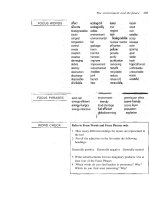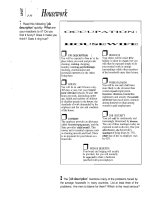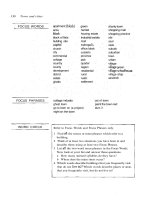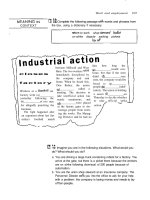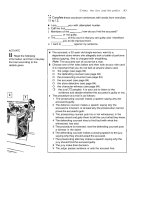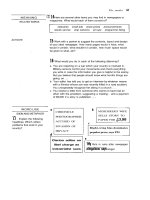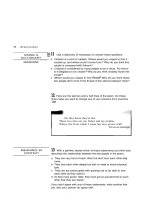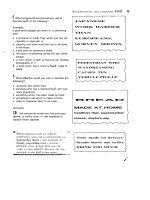more than words book 1 phần 3 ppt
Bạn đang xem bản rút gọn của tài liệu. Xem và tải ngay bản đầy đủ của tài liệu tại đây (938.46 KB, 20 trang )
Parts of speech: verbs and nouns
n
Verb
endings,
signal
changes
in
tense
and
aspect.
There.
are
two tenser,
present
and
fjgst.
Present ^.
ter&w
usually,
refer
to the
present,
(but
hpi
always!
and
past
tenses
usually
refer
to the
past
(bit
I
not
always).
-Aspect
sftowrs
whether
the
verb
tense
(present
or
past),
is
simple
(e
r
g,-
He
walks,-
//•-'
•walked),,
continuous
(e.g.
He
is
walking.,
he
been
milking).
perfect
lked-, for
has
VERB ENDINGS
PLURALS
4 Complete this chart of verbs from the text.
Infinitive
leave
keep
think
Present
participle
having
Past tense
hid
went
tried
Past
participle
made
grown
What is the difference between these verbs from
the text and verbs
like
talk,
love,
play and
wait?
••Fertnirig
the*
plurals
of
most
nouns
is
very
skmightforwarti.
Others
are
more
complicated*
0 Find the four plural nouns in the passage
opposite. What is the singular form of each
noun?
0 Work in pairs to find the plural of the
following nouns.
a donkey
b tomato
c ox
d
mouse
e mouse trap
f piano
g pheasant
h fish
i cloth
j syllabus
k ship
1
star
m
elephant
n man
o sky
p ostrich
q cello
r symphony
| Check your answers in a dictionary. Were you
right?
What do you know about the way we make
nouns plural? Is one way more
'regular'
than
others?
/ Read the continuation of the story from
page 28. You will find it on the next page.
a How accurate were your guesses in
exercise 2?
b What other facts about the writer and
his/
her situation do you know from this extract?
28
Parts
of speech: verbs and nouns
I waited.
•"I'tried
to make plans.
s
j-;
Instead
I found myself thinking
.
'of
irrelevant things: cold beer, buttered
toast, the time one of my children had chicken pox.
I dozed. Hours must have passed, and
there
was a
rainstorm.
It
left
me
soaked
again
but at
least,
1
reasoned, it should have washed away most of my scent,
making
it
more
difficult
if they came
after
me
with
dugs.
I heard
j
helicopter overhead. I burrowed deep
into
the
grass.
•
1 didn't need a
prize
to guess
that
the helicopter was looking
for us. Later in
the
morning I heard gunshots. I was
relieved because they were a long way off. Then I was ashamed:
it meant one of the others had probably been
shot.
I
felt sure it
must be
Kasujja.
He was the most vulnerable. Poor
Kasujja.
They'd got him.
Then I saw movement in the grass. It was what T feared: a snake.
It was a
mamba,
very poisonous. I kept
still,
telling
myself
that
snakes attacked only moving
^a:^
things, and then only because
they are afraid, not because they
are aggressive. T hoped
the
mamba
would
remember this. It had seen me,
raised its head, lowered it again, and then raised it
once more, tongue
flickering,
as it preparing to strike.
1
don't
know how long this went on. It seemed like hours.
Then the mamba decided it didn't like the look of me,
executed a
simultaneous
turn,
climbed
a wall and was gone.
Kato An Escape
from
Kampala
Grama
Volume
22
(Granta
Publications)
0 Describe the place
that
the writer is
in,
and
its surroundings. Make a drawing of it if that
would help.
a
What reasons can you think of for hiding
from somebody?
b Have you ever hidden from somebody
(other than in a
game}?
c
What do you think of when you are
miserable or frightened?
d
How do you feel about snakes? What
animals
are you afraid of?
Parts of speech: verbs and nouns 29
1U Invent an ending for the story.
Discuss the following in pairs and/or groups:
ArTiVATF
11 Tell
11 Tell a story about hiding from something
somebody. The story should have two
characteristics:
a It should use as many words as possible
from the texts in exercises 2 & 7.
b (t should be as unlike the story in exercises
2&
7 as possible.
or
8 Affixes
We often add
things
to the
beginning
or
end
of a
word'to
change
its-weaning,
or
status
We
aw
make
words
have
opposite
meaning,
(t:.g happy
-unhnppyithmp
thcit
a
verb
is
in
the
past
(e.g.
wash
-washed)
or
make-a-noun
into
an
adverb
($.g,
hope
-
hopefully).
-How
does
.this
all
work? .
.
'
•
SUFFIXES AND PREFIXES
The
ending
of
a
word will often
show
what
part of speech the word
/«&
become Frr
example
titc
-tion
at
the
end of
authorization
tells us that
the
word is
likely-to
in- a
noun
the
~s
at
the
end
of
hides tells
it$
that
this is cither the third
person-singular
(present
simple)
of
the
verb hide
,ot
.&&_.
plural
of
the
noun hide.
1 In these words, taken from the text on
C0Z
Complete the table below. What endings:
pages 26 and 28, (see box) what endings are
used for the
following?
noun
(singular)
noun (plural)
verb
adjective
fl
^
noun$
.^
verbs?
b turn verbs and
adjectives
into nouns?
c turn nouns and verbs into
adjectives?
waited
irrelevant children soaked
ashamed
vulnerable
poisonous
attacked aggressive flickering
simultaneous movement
Think of other nouns, adjectives and adverbs.
What other endings can you add to the list?
Noun
simplification
dirt
Adjective
quick
painless
stupid
Adverb
hopefully
xxxxx
xxxxx
xxxxx
Verb
legalize
drive
xxxxx
retire
wash
Affixes
si
PREFIXES (WORD BEGINNINGS)
If
word
etidings
change
the'-grantmdt
oftiwoni,.
word
heginnm$$
oftendiangc
ifa
meaning of a
word
For
example
tlw
Ttvrrf
irrelevant
in
ihc'tcpt
on.
page
30
means
'notrel&vant',
lr-
0 What meaning does the first part of each of
the following words have?
a oVsapprove
b inexpensive
C
i/rt
happy
d
//legal
e
descend
f nonsense
g
impossible
h expel
i
overestimate
j predict .
k
subtract
I coincide
m
rearrange
n
postpone
Some of the words can be used without their
prefixes (e.g. a approve) but some can't
(e.g.
e
*
scend
is not
possible}.
Which
words are like a and which are
like
e?
T
Using
beginnings (prefixes) make the
opposite of the following words,
a kind
b literate
c temperate
d honest
e centralize
f regular
g resident
h polite
ACTIVATE
Complete the text with the correct form of
the word in brackets. Check your answers in a
dictionary.
The day that Carol ran away from school was
one of great
W
. (anxious)
for
Miss
Angela
Beresford,
the
Headmistress.
But then
it had begun badly. She had woken up feeling
very
sick
and GO (well) and at work
almost all the teachers had been (3)
(agree) - not at all
pleasant
- because they
were cross about the latest pay settlement.
They had wanted a
10%
Increase,
but she had
only
been
able
to
offer
them
5%.
they
started
shouting at
hei
and after a bit she
(4) (yell) back at them. Now she wished
she hadn't. Even
after
ten years she still
tf)_ (estimate) the effect of her shout-
ing. She didn't think that it would affect her
teachers at all, but it always
did.
They would
get very angry and as a result they would
(G)
(active) work against
hei.
The
(7)____
(discover) later
that
moining
that Carol had run away (and run
away,
mind
you,
from
the
best
upper-class
girls'
boarding
school
in
the
country)
was quite
@)
Qiteral)
the last
straw.
So when she found
Carol's note - almost like a suicide's, com-
pletely
0)
(hysteria) - the thing that
really
upset her was the
school's
failure
(and
by
00)
__
(imply),
hers) to teach Carol
how to
spell,
'i
carnt
stey here
enimoor
coz
ov
Miss
Turner,'
read the note,
'she
is
honbul.'
32 Affixes
Angela Beresford read the note in
(in
(amaze). The girl's
08
(cruel) to Miss Turner was common know-
ledge. But it was then that she made the
0$
(decide) to stop being a head-
mistress.
Two
weeks
later
she
left
the
school
and joined the circus as a lion-tamer. It was
04}
(considerable) more fun and
certainly less 05} (danger) than her
previous
job.
0 Why do you think Carol ran away? Did you
go to a boarding school? Would you send
your child to a boarding school? Why? Why
not?
SPELLING
1
Correct
the spelling in Carol's note. Why do
you think she wrote the words in the way that
she did?
9 Spelling
English
spelling
is
usually
considered
difficult. That
r$
because,
there
often
appears
to
be
no
direct
• ,
relationship
'between'the
waif
something
sounds
cw&
the way it is
written.
Different
spellings
can
lutiethe
<«me
sound.
1 The following pairs of words have different
spellings. Do they
sound
the same or different?
throw
d
bow
(down)
through bough
a
flour b ruff
flower rough
L
The following pairs
of
words have the same
combination of vowels in their
spelling,
fs the
sound of the vowels the same or different in
each pair?
a through
though
b cough
tough
c shoe e key
hoe fey
d
afra/d
f seize
so/d
reign
g
team
sconce
h bury
bun
SOME SPELLING RULES
Ip-
there
anytiiing
about English
sp
which
is'Tegular,.
then?
Ah'
there
any.
rules?
doe?
spelling
change
when
word's
have
0
Add
-ed,
-d, -ing,
-er,
-r or
-esfto
the
following words. Should you double the last
consonant or not? Should you add a different
consonant?
a hop f fast k excel
b hope 9 beat I refer
c fat h develop m open
d late 1 begin n visit
e phone j rebel o panic
p picnic
q bat
r marshall
s omit
English
has
many
spelling
'rules'.
Can you
'
work
Ihem
owf
for
yourself?
•. "•
'V
1
Using your answers to exercise
3,
can you
say what happens to the
last
consonant in a
word when new endings are added in the
following cases?
o the
original
word ends in one vowel + one
consonant
{e.g.
hop).
b the original word ends in two vowels (or
more)
+ one consonant (e.g. beat).
c the original word ends in one vowel + two
consonants (e.g.
marshal!).
d the original word is a two-syllable word
with
the
stress
on the
first syllable (e.g.
open),
e the original word is a
two-syllable
with the
stress on the second syllable
{e.g.
refer),
f
tfie
original
word ends in a single I (e.g.
rebel}.
(Note: this does not apply in
American English.)
g the
original
word ends in a c (e.g.
p/cm'c).
D
Look at these words. What are the
rules
for
a final -e when something is added to the end
of a word?
a
hope-hoping,
rope-roping,
fume-fuming,
fame-famous
b
see-seeing,
agree-agreeing-agreeable
c knowledge-knowledgeable, orange-
orangeade, re
place-replaceable
replace-replacement,
hate-hateful, live-lively
t bleat e
due-duly
y
argue-argtiment,
true-truly
34 Spelling and sounds
0 Look at the following words. Which are
spelt correctly
(c},
which are
spelt
wrongly
(wj?
There
arc
several
difference*
between
British
a friend
b
feild
t fftrfiivfi
d
concieve
e believe
f
ceiling
g seize ,
h
greif
What sound is being spelt here by ei or ie?
What is the rule? What has the letter c got to
do with it? Why is seize an exception?
:
in
-British
English
we
twite
colour,
irhilt!
:•
•
(/ie
Americans
write
color
UP
*
"ut
A {— American
English)
or B
{=
British
English) for each of the following spellings. Use
a dictionary to help you.
a theater ( ) g theatre { )
b humanize { } h refueling ( )
c humour ( ) i traveller { )
d recognise { )
j
check
(book)
( )
e colorless ( ) k sulfur ( )
f
sulphur ( )
1
cheque (book) ( )
ACTIVATE
0 Correct the
spelling
in the following
children's sayings (collected by Nanette
Newman
in a
book called
Lots
of
Love}.
! love my daddy becorse he give me a good
ejukashun.
Zoe aged 6.
My mummy sais I must love evreyboddy even
the
peple
who killed my daddy but 1 dont.
Helen
aged 7.
My Dad went to prison and we have to keep
remembring to love him. Jean
aged
7.
My teecher is very
crule.
She
smaks
peple all
days and she eats frogs
legs
and
maks
cros
spells.
1
dont
like
her
becose
she
says
1
tell
fibs. David aged 6.
My father has a cros face in the holedays.
Joan aged 7.
Old
ladys
arent
reely
old
ladys.
There
just
pepel
waring old clothes, Jamie aged 6.
Spelling
and sounds 35
9 What do you think is the background to
Helen and Jean's
comments?
Ill
In groups decide on five
adjectives
to
describe the following:
a a good mother
b a good father
c male
children
d
female children
10 Countable and uncountable
J1
Look at these exchanges:
A Would you like a
?
Yes, please.
B Can I offer you
some
?
No, thanks.
Many different words could go in the empty
spaces above. Look at the words listed below,
and decide which words could go in which
dialogue by marking them A or B. Then
explain why. Do not change the words and
phrases listed in any way.
milk
medicine
new shirt
day off
chewing tobacco
companionship
meal in a
restaurant
pair of scissors
banana
_ ticket
biscuit
brown sugar
mineral water
ride on my
motorbike
friendly advice
useful information
money
help
_ salt
work
Isfottws
can
be
countable (tike chair
-»
'"jAror
chairs)
or
uncountable
(like
information).
It is important to know
what
HnS.
of noun you are using because
it may change the
grammar
of the whole
sentence.
For
example,
countable nouns
may be singular or plural (e.g. girl
—*
,
girts,
woman
-»
women); uncountable
nouns are always singular
(oxygen,
but
not
*oxygens).
Uncountabk
nouns
cannot
have
a or an before them, and
* often have no article
before
them,
(e.g.: I
like
coffee.
Love
is all you
need.)
Which of the words and expressions in the
box above are countable, and which are
uncountable?
L
Read the recipe on the opposite page. Is it
something you would like to eat? Why? Why
not?
List the underlined words from the ingredients
in the two boxes below:
UNCOUNTABLE
COUNTABLE
are uncountable.
countable
by using
words
to
quantity,
3 For each of the quantities below, find at
least one - and if possible three - appropriate
kinds of uncountable food or drink.
a a slice
of
b two spoonfuls
of
e a loaf
of
d a glass
of
e a piece
of
f a cup
of
g three bowls
of
h a bunch
of
i a pinch
of
j
a drop
of
Countable and uncountable 37
Stir-fry Chicken and Vegetables
(for
two)
Ingredients
boneless chicken meat
(200
grams)
bean sprouts
(100
grams)
7 or 8 mushrooms
1 green pepper
thin noodles
(100
grams)
1 small onion
1 clove of garlic
groundnut oil (4 tablespoons)
soya sauce (3 teaspoons)
salt and pepper to taste
Cut the chicken, pepper and mushrooms
into small pieces. Chop the onion and
garlic finely.
Put 1 tablespoon of groundnut oil into the
wok and heat well. Then add the chopped
onion and garlic. Stir until lightly
browned.
Add a teaspoon of soya sauce and the
pieces of chicken. Stir fry for eight
minutes. Place the cooked chicken in a
separate bowl.
Put more groundnut oil in the wok.
Then add the chopped pepper, with a
teaspoon of soya sauce. Stir fry until
tender. Add the chopped mushrooms.
Stir fry for two minutes. Then remove
from the heat.
Boil a pan of water, and add some salt.
Remove from the heat and place the
noodles in the boiling water for three
minutes. Then drain with a sieve.
Put more groundnut oil and sey sauce in
the wok and heat well. Then add the
beansprouts. Stir fry for two minutes
before adding the previously prepared
noodles, mushrooms, pepper and chicken.
Stir constantly for one minute, adding
more salt, pepper and soya to taste. Then
serve.
38 Countable and uncountable
ACTIVATE
4 Write a short recipe in English for a dish
that you like (and know how to prepare). Then
join a group of three or four and exchange
recipes. See if your dishes can be put together
to make an interesting meal.
0 Which of the following is unusual or wrong?
Why?
a
b
Do you want a cola?
I want some information, please.
c Could we have two teas and some cake,
please.
d There is some apple on the table.
Kmmn^r
-t,g.
*®jfre,
,S
e
David went to the
baker's
and bought three
breads.
She gave me some good advices.
How much dollars do you have?
Listen to the noises that animal is making.
Strange, aren't they?
What progresses have you made since we
last met?
uncountable
nouns (e.g. I
spilt
some
,nejfie
on
mjftf^m^m>
f
m
'«wffiWM
"mtms
(e.g.
Cm
J-AM^IJPO
e&ffe&i
'
I
9
h
ID
Tick (
/)
the nouns in the following list which
can have two different meanings, one when
they are used as countable nouns (e.g. Can we
have three chocolate ice
creams,
please. =
separate servings of ice cream), and another
related meaning when they are used as
uncountable nouns (e.g.
You've
got some ice
cream on your shirt = a drop or blob of ice
cream). For each word that you tick, give two
examples: one using it as a countable noun,
and one using it as an uncountable noun (do
not use piece of, glass
of!).
courage light wood homework
mineral water cauliflower cola
advice ice cream , paper lamb
parking salad information beauty
anger weather hope smoking cake
Which words in the list above can only be
used as uncountable nouns?
INVARIABLE NOUNS
A-
number
i^mum
mn
only
be
plural. This
is
often
because the objects which they refer
.g
trousers,
spectacles,
mi
tneikef
's
just the way
the
English
l
Z Which of these nouns only exists in a plural
form?
eyes binoculars feet shorts pyjamas
clothes scissors earnings people socks
premises cattle remains (eye)glasses
thanks scales outskirts boots
Countable and uncountable 39
The
ethers
ere
ordtseases.
Of course, these words
must
be
0 Look at this box which shows some common
'singular'
nouns.
news
games
dominoes
billiards
draughts
subjects
mathematics
linguistics
classics
diseases
measles
mumps
diabetes
ACTIVATE
9 Complete the following exchanges using the
words in brackets to make correct sentences.
Example A: I
don't
know what to wear to the
interview.
B:
(your green
trousers/nice/why
not/wear?)
Your green trousers look nice.
Why don't you wear them?
a A: Now, Ms
Harper,
how can you justify
demanding a
salary
rise of ten per cent
for your members?
B: (Because/earnings/dramatically affected
by the rate of inflation)
b A: Hullo, Mrs Jones. You look very upset.
Whaf
s the matter?
B: (Your cattle/in my garden/eat/my flowers
and vegetables!)
e A: But, Doctor, I can't be that heavy!
B: (I can assure you/scales/checked and
adjusted/only last week)
d A:
Well,
Jamie, back from school already?
How was your day?
B:
(OK/the
good news/passed my English
exam;/the bad news/was suspended for
cheating)
e A: How did you know I was English?
B: (English
people/usually/shy/and/other
languages badly)
f A: I love playing pool.
B: (I
think/billiards/much
better game)
g A: Where do you work, Jack?
B: (My compan/s main
premises/
London, but I usually
work/
Manchester. The premises in London
house/Head Office and Sales
Department)
h A: Dad, can you give me a
haircut,
please.
B:
(OK;/where/scissors?/l
haven't
seen/
weeks)
10 Prepare a brief news broadcast for local
radio or TV. It should contain three or four
brief
'stories'.
For example, a man is found
sleep-walking to work, a member of the royal
family tries unsuccessfully to cut the ribbon to
open a new institution of some kind, or a
house is raided by policemen at three o'clock
in the morning after neighbours have
complained about something.
Each story should involve using at least two
words which always have the plural form.
Begin: Here is the Local
News
11
Verbs
TRANSITIVE AND INTRANSITIVE VERBS
1 Make up at least two appropriate endings
for each of the sentences below. If possible, at
least one of the endings should contain an
object (for
example,
in John drank some
milk,
some milk is the object of drank).
O a The Prime Minister
sent
b The children
played
e The baby only
sleeps
d Can you help ?
e
Lef
s
go
f Put
g Did you
understand
?
h Have you
paid
?
i Marilyn Monroe
died
I
The rock star was
wearing
Now, in the spaces on the left, mark the
sentences O
(=
verb must have an object), NO
(= verb can't have an object) or
X (= verb can sometimes have an object, but
can sometimes be used without). The first one
is done for you.
y
verbs can be used
transitively
object
- e.g. The children
ate
at
2
L
List below at least five other verbs which
must be followed by a direct object and three
verbs which can't be followed by a direct
object.
Followed by a
direct object
(= transitive)
put
Not followed by a
direct object
(= intransitive)
sleep
3 The following letters were printed in a
newspaper. Read them and find out:
a what the
writer's
problem is
b what attitude she seems to have towards her
boyfriend
c why Jackie suggests she should say nothing
Dear Jackie,
I have a lovely boyfriend.
Everything about him I
love apart from one little
thing. He is 1m 72 and
should weigh about 65 kg.
But he eats so much and
takes so little exercise he is
now 77 kg. He looks
awful.
I try hard to encourage
him, suggesting we play
squash or go swimming
together, but he says I'm
always nagging him. I'm
worried that although he's
only 30, he's a prime
candidate for a heart
attack.
Anxious,
Southampton
nxious,
S^KST*-
,,nt
ng
f
^
S
P
fes
ent
unhealthy
ii
festyje
perhaps
y
ou
should
try
bv
Verbs 41
4 In a close relationship with someone of the
opposite sex, which of the following would
you find it hardest to tolerate? Put 1 beside the
hardest and 5 or 6 beside the easiest to
tolerate.
a
b
constant nagging
too much concern for your health
too much concern for your
appearance
too much talking
laziness when it comes to household
chores
other.
I) As used in the letters, which of these verbs
are not followed by objects?
love
eats
looks try nagging feel
ACTIVATE
0 Use these verbs (and others from the box
above) in a brief dialogue between
'Anxious'
and her boyfriend. Use the verbs in bold
twice — once with an object and once without.
eat weigh go die play leave get
PHRASAL VERBS
1
Read the following poem quickly. What
does it describe? Is it a happy or a sad poem?
Why?
Single Mum
A penetrating cry:
She gets up, fighting off the sleep,
Puts on the old blue dressing gown
And switches on the blinding bedside lamp
For the third time that night.
'Come
here':
She picks him up, the soft warm bundle,
And rocks in her arms the ruler of her life.
Mournful cries turn instantly to smiles
That say
'play
with me
tonight'.
It's
three a.m.:
How can she turn him down?
How can she put him back?
There's space beside her in the wide wooden bed
For this bubbly baby and a cuddly toy or two —
Some comfort in the night.
42
Verbs
0 Which of the following people do you think
is in the most difficult situation?
a A single mother with the care of a young
child or children.
b A single father with the care of a young
child or children.
e
A
single parent with responsibility for
teenage children.
d A single parent who only sees his/her child
every two weeks.
e A child who hardly ever sees one of her/his
parents.
f A child who lives with parents who often
quarrel violently.
What do the phrasal verbs in the following
sentences mean?
a The plane took off more than an hour late.
b It was so hot Mary took her sweater
off/took off her sweater.
c Roger didn't know what the word meant so
he looked it up in the dictionary.
d "Come on! We're going to be late!"
e Claudia didn't want her old records so she
gave them away.
f The Director put the meeting off until Friday.
g The car broke down so they had to walk
home.
Some verbs in
English
consist
of two
parts,
e,g.
take
tip-f**%gdrif>
practise
a
Mby&r
sport).
The first
f«rf
»ffift
ordinary
verb,
btt^$te-'0th$r.
part
or
a
ward
lite
up,
an,
ati^w^
%jjfe<#C'
'JSoiwe
of flfese
verbs
ore
called
phrasal
verbs.
It
is
often
difficult
to
^^^torf
taite
phrmal
verbs mean
at first
|fte
original
meaning
of the verb and
article (the other part) has
changed,
~"NBA:
over
the
company
means
she
mntrol
of the
management
of
it.
Look at these phrasal verbs from the poem.
What do they mean?
get up switch on put on pick up
turn down put back
Like ordinary
verbs,
phrasal verbs cm be
either
transitive
(followed
by an tibj&t) .
intransitive
(not
followed
by
an
object).
11 Which of the phrasal verbs in exercise 9
are transitive? What do you notice about the
word order of these transitive phrasal verbs?
Does the particle come before or after the
object?
Complete the sentences in the box with before
and after.
Sometimes the particle (on, up, down, away,
etc.) comes the object. Sometimes
it comes the object. It always
comes an object which is a
pronoun (it, him, her). If the object is a noun,
it can come or
Verbs 43
ACTIVATE
Complete the following using phrasal verbs
from the box and putting the objects of the
phrasal verbs in the appropriate place.
If you are not sure of the meaning of a
phrasal verb, use a dictionary.
put
up bring up invite out/take out
ring up split up
warm
up
take
back
workout
send
away
get
up
set
off
pick up
Mike and Judy have two young children: Alison,
aged 8 and Peter, aged 5. They are very lively and
affectionate children, and both parents have
enjoyed
(')
(them). But Mike and
Judy's marriage wasn't (2) , and six
months ago they decided to (3)
Judy and the two children stayed in their small
suburban house, and a friend from work
W
(Mike) in his flat. Then Mike's
company (5) (him) to open a new office
in the south of the country.
Now Mike only sees his children once a month,
although he
(
6
)
(them) once or twice a
week. On the first Saturday of each month he
(
7
)
on the 300 mile journey to the
north.
He (8) (the children) from their home
about
lunch
time and
(
9
)
(them) to
lunch at a hamburger restaurant. At first, father
and children are almost like strangers, but then the
conversation
(
10
)
, and they begin to
talk about what they've been doing for the last
month - life at school, their friends, their new toys.
After playing in the park or seeing a film, it's time
to
(")
(Alison and Peter) and leave
them with their mother. The next day, Mike
(12) early,
(
13
)
(the children)
for lunch again, says goodbye to them with a heavy
heart, and returns to the south. When he sees the
expressions on his children's faces, he sometimes
wonders whether his visits do more harm than
good.
PREPOSITIONAL VERBS
*?.
cannot
say
*'she
looked the picture
at',
or
*'she looked it
13 Which of the sentences on the right
contain prepositional verbs? (You can test
whether a verb is a prepositional verb by
seeing whether it is possible to move the
object next to the verb.)
a She broke off the relationship.
b He applied for a driving test.
c The board decided on a new plan for the
company.
d John put on his sweater.
e The Director is relying on his managers.
f Who is looking after the children?
44 Verbs
PHRASAL-PREPOSITIONAL VERBS
.
weather?.
Tte&?
,
the
last
of which
is
a
preposition,
e.g. How
do
you
mvatwaystrmsitm,
md
the
object
comes
after
all
three
"'
'
:
'
'
""
ll
What do you think the following mean?
a I'm not putting up with your tantrums any
longer!
b These days you've got to stand up for
yourself.
c Try to cut down on the amount of fat you
eat.
d
You must face up to your problems instead
of trying to hide from them.
ACTIVATE
15 Correct any mistakes you find in these
sentences.
Then,
with a partner, try to express
the same meaning using different words.
a Put your clothes away. This room is a mess!
b Get the story on with: I want to know what
happened.
c The plane took off three hours late.
d Bob: You made up that
story,
didn't you?
Sue:
No,
I didn't make up it.
e Can you put me up for the night? Hotels are
so expensive.
I
Get the car in. I'll drive you to the airport.
g Get the car out. I want to put my motorbike
in the garage.
h
John is going to stand in for Lynn while
she's on holiday.
i Sarah: Where are my old
jeans?
Dad: I've thrown away them.
j Get my bicycle off. I want to ride it now.
ID
Imagine you work as a TV journalist. Use
at least five of the following phrasal and
prepositional verbs to prepare questions for an
interview with a film or pop-star. Ask about his
or her daily life, family, etc. Then ask a partner
to play the part of the star and interview her
or
him!
PHRASAL VERBS: wake up, get up, put on,
phone up, go out, take out, keep on (=
continue), etc.
PREPOSITIONAL
VERBS:
agree
with,
believe
in, belong to, listen to, look for (= search
for),
take after
(-
be similar to family
member)
PHRASAL/PREPOSITIONAL
VERBS: put up
with, look forward to, face up to
12
Verb
complementation
DIRECT AND INDIRECT OBJECTS
1 Here are some extracts from magazine
advertisements. What do you think they are
advertising?
Which of the ads sounds most interesting to
you? Why?
46 Verb complementation
L
Each of the advertisements contains a verb
which is followed by two objects. One is a
person and the other is not. Sometimes there is
a preposition to before the person. List the
objects in the table opposite.
Verb
e.g. offering
brings
leave
give
send
Personal object
you
Other object
a free 15 day
trial
.
In
She
car, the car
is
the direct object and
her
husband is
fte
indirect
dtject.
objects
relate
to questions
like:
Who
did she lend it
to?
Who did
she
tell? or Who did
she buy it
for?.
Direct
objects
relate
to
questions
like:
What
did she
lend? What
did she
tell
him? or What did she buy?
6 Read the following examples. All have
prepositions before the personal 'indirecf
object. Which do you think can be changed as
in the example?
Verbs followed by a direct object
+ preposition + personal object
Example:
He lent some money to his daughter
—»
He
lent his daughter some money.
a They bought a drink for the bridegroom.
b We showed the photos to the police.
c We showed them to the police.
d David made the cake for his girlfriend.
e David made it for his girlfriend.
f I explained the accident to the police.
g The President said a few words to the
children.
h The old man told a story to the visitors.
Now check the list opposite. Were you right?
Verbs followed by indirect object
+ direct object
POSSIBLE
He lent his
daughter/her
some money.
They bought the bridegroom a drink.
We showed the police the photos.
David made his girlfriend a cake.
The old man told the visitors a story.
NOT POSSIBLE
* We showed the police them.
* David made his girlfriend it.
* I explained the police the accident.
* The President said the children a few
words.


